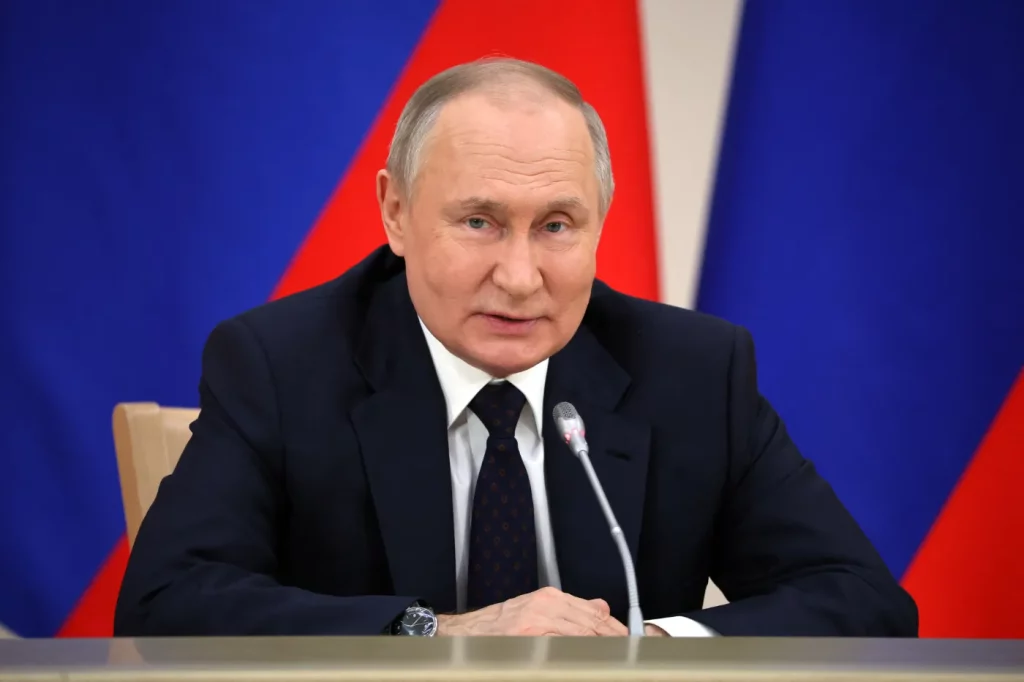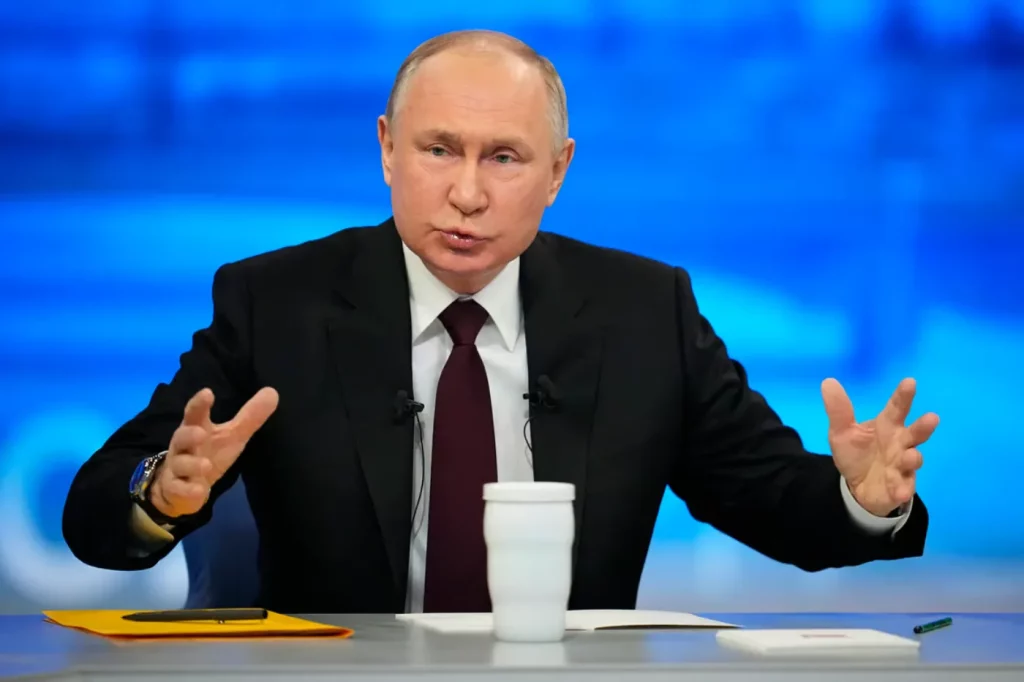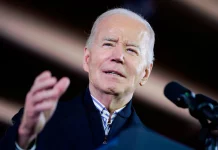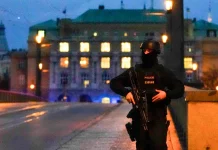MOSCOW — Russian President Vladimir Putin held a four-hour news conference on Thursday, where he vowed to continue the war in Ukraine until his goals are met, dismissed the allegations of using body doubles, and answered questions from journalists and citizens.
Putin, who has been in power for nearly 24 years and is running for re-election, used the event to assert his authority and justify his military intervention in Ukraine, which has triggered a major crisis with the West.
He said that there are about 617,000 Russian troops in Ukraine, including 244,000 reservists who were mobilized to join the professional forces. He ruled out the need for another wave of conscription, which has been unpopular and caused many Russians to flee the country. He said the army is recruiting 1,500 volunteers every day and has signed contracts with 486,000 soldiers.
He also boasted of the Russian army’s advances along the front line, saying it has improved its positions and repelled a large Ukrainian counteroffensive. He claimed that the Ukrainian army suffered heavy casualties and failed to establish a bridgehead on the eastern bank of the Dnieper River.
He accused Kyiv of sacrificing its soldiers to please its Western backers and secure more aid. He said this was “stupid and irresponsible” on the part of the Ukrainian leadership, but added that “it’s their business”.
Putin reiterated that Russia’s goals in Ukraine are the same as they were when he ordered the invasion in February 2022: “de-Nazification, de-militarization and a neutral status” of Ukraine. He said these are vague terms that mean different things to different parties, but insisted that they are essential for peace.
He said that Ukraine must renounce any aspirations to join NATO and purge its government of radical nationalist and neo-Nazi elements, which he said are a threat to the Russian-speaking population in eastern Ukraine. He dismissed these claims as false and baseless by Kyiv and the West.
He said that Russia is ready to negotiate with Ukraine and its Western partners, but only on the basis of respect and equality. He said that Russia is not seeking a confrontation with anyone, but will defend its interests and security.
He said that there will be peace in Ukraine when Russia’s goals are met. He said that this is inevitable and that “victory will be ours”.

He reaffirmed his claim that much of today’s Ukraine, including the Black Sea port of Odesa and other coastal areas, historically belonged to Russia and were given away by Soviet founder Vladimir Lenin.
He said that Moscow had accepted the new reality after the USSR’s collapse in 1991, but was forced to respond to what he described as an attempt by the West to turn Ukraine into a tool to challenge and threaten Russia.
He said that Russians and Ukrainians are one people, and what’s going on now is a huge tragedy, a civil war between brothers who have found themselves on the opposite sides.
He said that his last news conference was in 2021 as the U.S warned that Russia was about to send troops into Ukraine. He said he delayed an annual state-of-the-nation address until February 2023.
He said that relations with the U.S. since then have plunged to new lows as the conflict continued. He said that Russia detained Moscow-based U.S. journalist Evan Gershkovich in March.
He said that shortly before he spoke, a Russian court ruled that Gershkovich, 32, must stay behind bars until at least Jan. 30.
He said that U.S citizen Paul Whelan, a corporate security executive from Michigan, also has been jailed in Russia since his 2018 arrest on espionage-related charges.
He said that Russia recently rejected an offer to bring home Gershkovich and Whelan, both labeled by the U.S. government as wrongfully detained.
He said that “we’re not refusing to return them,” but added he wanted to reach an agreement but “it’s not easy.” He refused to elaborate but said Washington “must hear us” and make an offer that satisfies Russia.
He said that on the Israeli-Hamas war, he again deplored the death of thousands of women and children in Gaza, citing U.N. Secretary-General Antonio Guterres, who called it a “graveyard for children.”
He urged stronger efforts to protect civilians and urged greater humanitarian aid, adding that Russia proposed setting up a field hospital in Gaza near the border with Egypt but Israel responded it would be unsafe. He reaffirmed a call for implementing a U.N. resolution on the creation of a Palestinian state with East Jerusalem as its capital.
He appeared calm and relaxed during questions, although he frequently cleared his throat, blaming the air conditioning. He said that the event is primarily aimed at a domestic audience and is a chance for him to appear personally involved in resolving the problems of ordinary Russians and reinforce his authority ahead of the March 17 election.
He said that responding to a final question about what kind of warning he would have given to himself from today’s perspective when he started his first term in 2000, he said he would have warned against “naivety and excessive trustfulness regarding our so-called partners.”

He was also asked by an artificial intelligence version of himself, speaking with his face and voice, on whether he uses body doubles — a subject of intense speculation by some Kremlin watchers. Putin brushed off the suggestion.
“Only one person should look like myself and talk in my voice – that person is going to be me,” he said, deadpanning: “By the way, this is my first double.”
He said that he also fielded questions from children in Russian-annexed Crimea about the leaking roof and mold in their sports hall, and a woman who addressed “my favorite president” to complain about the rising price of eggs. He apologized and blamed “a glitch in the work of the government,” for not increasing imports quickly enough.
He said that journalists lined up in freezing temperatures to enter the hall hours before his arrival. He said that some donned traditional dress, including elaborate hats to catch his attention or held identifying placards.
He said that although the event is tightly controlled, some online questions that he ignored appeared on screens in the hall.
He said that one text message said, “Mr. President, when will the real Russia be the same as the one on TV?” He said that this apparently referred to the Kremlin’s control over the media that portrays him positively and glosses over the country’s problems.
He said that another read: “I’d like to know, when will our president pay attention to his own country? We’ve got no education, no health care. The abyss lies ahead.”




